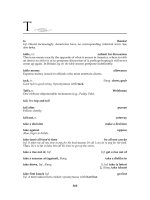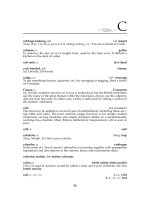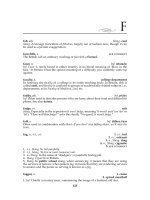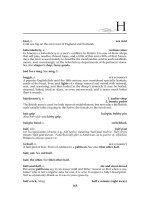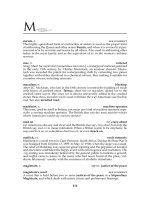British English A to Z - past 3
Bạn đang xem bản rút gọn của tài liệu. Xem và tải ngay bản đầy đủ của tài liệu tại đây (179.1 KB, 27 trang )
98
dab, n. Inf. whiz
Inf. Used in the expression to be a dab at, sometimes lengthened to be a dab hand at,
meaning to ‘be especially adept at.’
dabbly, adj. wet
Slang. A dabbly summer is one with frequent rain. Most people think that dabble is
used only in the expression to dabble in, i.e., ‘engage in superficially,’ as to dabble
in the market or in a hobby. But its primary meaning is to ‘moisten intermit-
tently’—hence a dabbly summer.
dab in the hand, Slang. bribe
dabs, n. pl., Inf. fingerprints
And the singular dab means ‘fingerprint.’
daddy-longlegs, n. crane fly
In Britain, a daddy-longlegs is a crane fly, an insect of the family Tipulidae of the order
Diptera, resembling an enormous mosquito and popularly called the mosquito hawk.
In America called also harvestman, but not identical with the British insect.
daft as a brush Inf. very silly
daggerplate. See sliding keel.
daily woman cleaning woman
Inf. Often shortened to just daily. Sometimes daily help. See also char, 1.
dainty, adj. Inf. picky; finicky
Inf. About food; a term applied to young children who are hard to please at meal-
time. See also faddy.
dambusters Inf. see comment
In May 1943, Lancaster bombers from an elite RAF squadron audaciously
attacked dams on the Ruhr River of Germany. Using specially designed ‘bounc-
ing bombs’ designed to be launched from a low height, they aimed to breach the
dams and flood the industrial areas lying below them. The raid had limited suc-
cess, but tremendous propaganda value; it went into the language as a synonym
for any brave and successful enterprise. The job went like dambusters.
Dame, n. see comment
A woman who is knighted becomes a Dame. A Dame should not be confused with
a Lady. See also Lord for other titles.
damn all Slang. nothing at all
Slang. This expression is in fairly wide use and would not be considered improper
in normal company, even mixed. Americans might hesitate for a moment before
d
h
saying, I can’t find a damned thing. The British would say, “I’ve got damn all,” or
more commonly, "bugger all" or "fuck all."
damp course insulating layer
A damp course or damp-proof course is a layer of tarred felt, slate, etc., placed above
the house foundation to prevent deterioration in the walls of a building caused
by rising damp, a troublesome phenomenon in Britain.
dampers, n. pl. flat cakes
Slang. Made of flour and water, usually by Boy Scouts, and not recommended
for gourmets. Damper is used as well in the various senses in which it is used in
America in connection with fireplaces, pianos, etc., and figuratively in the sense
of a ‘wet blanket.’
damp squib Slang. bust; dud; lead balloon
Inf. One of those things, like a Church Bazaar or a Charity Ball that was going to
be a howling success, but. . . . A squib literally is a firework, giving us all we need
to understand ‘damp squib.’
damson, n. a small blue-black plum
darbies, n. pl. Slang. bracelets
Slang. Handcuffs. The British term is said to be derived from the expression Father
Darby’s bands or bonds, a particularly rigid form of debtor’s bond invoked by usu-
rers in the good old days.
Darby and Joan see comment
Inf. This sentimental nickname for any loving couple of advanced years is sup-
posed to have originated from an allusion in a ballad that appeared in 1735 in a
publication called Gentleman’s Magazine. The poem, entitled “The Joys of Love
Never Forgot,” went:
Old Darby, with Joan by his side,
You’ve often regarded with wonder.
He’s dropsical, she’s sore-eyed,
Yet they’re never happy asunder.
Membership in Darby and Joan Clubs all over Britain is open to those whom
Americans so tactfully call Senior Citizens and Golden Agers and the British Old
Age Pensioners, usually shortened to O.A.P.s.
dashed, adv. Slang. damned
Slang. Milder than damned in expressions like dashed good, dashed bad, and the like.
Also heard in Well, I’m dashed, where Americans would say, Well, I’ll be damned!
Dashed may be on the way out as language becomes freer in a more permissive
society.
daughter concern subsidiary
A company owned by another company. The family relationship of the subsid-
iary is recognized in the American expression parent company, but the Americans
keep the sex of the subsidiary a secret.
davenport, n. writing table; escritoire
In America this word means ‘large sofa.’
davenport
99
daylight robbery Inf. highway robbery
Inf. Figure of speech, like holdup, meaning ‘unashamed swindling,’ an ‘exorbitant
price or fee.’
day return. See return.
day sister. See sister.
day tripper. See tripper.
dead-alive, adj. Inf. dead; more dead than alive
Inf. Sometimes dead-and-alive. Of a person, ‘unspirited’; of work or a place,
‘monotonous, boring.’
dead cert Inf. sure thing
Slang. Cert is short for certainty.
dead keen on. See keen on; mad on.
dead man’s shoes see comment
This rather grim phrase describes something that somebody is waiting to inherit
or succeed to, for example, his boss’s job.
dead on Slang. on the nose
Inf. Exactly right. See bang on for synonyms.
dead set at. See make a dead set at.
dead slow extremely slow
Often seen on traffic signs meaning as slow as possible. In both countries, ship-
board signal from bridge to engine room.
dead stock farm machinery
The term dead stock is occasionally used to mean ‘unemployed capital’ or ‘unsal-
able merchandise.’ However, it has a special use in connection with the sale of
country property. One sees signs advertising an auction of such and such a farm
property, sometimes with livestock and sometimes including dead stock. Undoubt-
edly, an echo of the common term livestock.
dead to the wide. See to the wide.
deaf-aid hearing aid
deals, n. pl. lumber
For British meaning of lumber, see lumber, n.
dean, n. cathedral head
See under head, 1.
death duties inheritance tax
The estate tax levied on property after the owner’s death.
debag, v.t. Inf. cut down to size
Slang. Literally, debag means to ‘pull somebody’s pants off,’ bags being slang for
‘pants,’ or as the British say, trousers. Figuratively, it means to ‘deflate’ a person.
100
daylight robbery
debus, v.t., v.i. get out of an automobile
(Accent on second syllable: dee-bus, em-bus.) Embus is to get in. See detrain and
entrain. Military terms. Also applied to unloading ammunition etc. from a vehicle.
decasualization see comment
Increasing the number of so-called permanent jobs in a nation’s economy, per-
haps by abolishing casual labor. See casual labourer.
decillion. See Appendix II.D.
decoke, v.t. decarbonize
To do a ring job on a car.
decorate, v.t. paint
In context, decorating a room or a house means ‘painting’ it, and house painters are
sometimes referred to as decorators. The word has nothing to do with decoration in
its general sense, nor with interior decorating.
deed-poll, n. unilateral deed
A legal term describing a document signed by a single party. Poll is an old verb
meaning to ‘cut evenly,’ as for instance, the edge of a sheet. A deed-poll is writ-
ten on a polled sheet, one that is cut evenly and not indented. The common use
of a deed-poll nowadays is as a document by virtue of which one changes one’s
name.
degree day commencement
This is a university term and has nothing to do with weather measurements, as
in America.
degree of frost degree below 32°F
In America, 20°F is 20° above zero, or simply 20 above, or even more simply, 20. In
Britain, 20°F is announced as 12° of frost. Formula: X° of frost in Britain = (32 – X)°
above 0 in America.
dekko, n., Slang. Slang. gander (glance)
A look: She asked to have a quick dekko.
demarcation dispute jurisdictional dispute
Between unions, or between different departments in a company. At risk is the
work available.
demerara, n. see comment
(Rhymes with sahara.) Raw cane sugar, light brown, frequently served with cof-
fee. Imported from Demerara, in Guyana. See also coffee sugar.
demisemiquaver, n. thirty-second note
Musical term. See Appendix II.F.
demister, n. defroster
Automotive term. See Appendix II.E.
demo, n. demonstration
Inf. A street demonstration, or a demonstration of something the demonstrator wants
you to buy. In the U.S., a sample recording by a musician.
demo
101
demob, v.t. discharge
Inf. (Accent on the second syllable.) Short for demobilize and demobilization. A mili-
tary term. See bowler-hatted.
demonstrator, n. laboratory assistant
At an academic institution.
dene, n. 1. sandy stretch by the sea
2. dune
3. wooded vale
denominational school parochial school
denture, n. removable bridge
A denture, in America, is usually understood to denote a set of upper or lower
false teeth. It is used that way in Britain, too, but the term is also used for any
removable bridge, whether one or more teeth are involved. Bridge means ‘fixed
bridge’ only. Dentures, in the American sense, are occasionally referred to in Brit-
ain, especially by older people, as dentacles or dentals.
departmental store department store
deposit account savings account
Cf. current account, running account.
Derby, n. see comment
(Pronounced ‘Darby’). The famous annual horse race held at Epsom Downs
every June. It is a flat race for three-year-old horses, run over a distance of one-
and-a-half miles.
de-restricted road road without speed limit
For many years there were no speed limits on British country roads. Now the
government has imposed an overall speed limit of 70 m.p.h. However, as one
approaches a city, town, or village there are signs reading “30” or “40” restricting
the driver to those limits while passing through those areas. Once beyond the
geographical limits, you find a de-restriction sign, which means that you are back
on the overall speed limit of 70 m.p.h.
Desert Island Discs see comment
A popular, long-running radio program on BBC Radio 4 in which a guest chooses
eight pieces of music that he or she would like to have if stranded, alone, on an
island. The guest talks about his or her life, both generally and with reference to
the music, and an excerpt from each piece is played on air. The phrase ‘Desert
Island …’ has entered common usage as describing any favorite in any category:
Desert Island dish, Desert Island book, etc.
desiccated coconut shredded coconut
Des. res., n. abbrev. desirable residence
102
demob
dessert, n. fruit course at end of meal
In Britain dessert is a fresh fruit course (sometimes also nuts and/or trifling
sweetmeats) served at the end of a meal either after, or in place of, what the
British call a sweet. British dessert can be any fresh fruit. Dessert in America is a
generic term for the last course of the meal whether it consists of fruit, pudding,
ice cream, or whatever. In spite of the aforementioned restricted use of dessert
in Britain, the British use dessert plates, dessert knives, dessert forks, and dessert
spoons.
destructor, n. incinerator
detached house. See semi-detached; terrace.
detain, v.t. 1. arrest
2. keep
1. Often used in this sense in America. Three men were detained in connection with
the shooting of a policeman. A man was detained after a raid on a bank. See also assist-
ing the police.
2. Used commonly about people kept in the hospital after an accident, as opposed
to those whose injuries were superficial. In American you would be kept in the
hospital; in Britain you would be detained in hospital (no article). See also Appen-
dix I.A.2.
detained during the Queen’s (King’s) pleasure sentenced to an
indeterminate term
Sometimes, during His/Her Majesty’s pleasure. Predictably, there is the story of the
woman so sentenced during the reign of a male monarch: “I thought I was too
old for that sort of thing.”
developer, n. real-estate developer
Used by itself, in Britain and in America, the term describes a person engaged in
the purchase of land and the erection of buildings on it. It sometimes appears in
the phrase property developer. In both countries developer also means ‘photographic
developing solution.’
development area see comment
An area suffering from temporary or intermittent severe unemployment.
devil, n., v.i. 1. law apprentice
2. literary hack
Americans may be familiar with the old-fashioned term printer’s devil meaning
‘printer’s errand boy’ or ‘junior apprentice.’ In Britain devil has two additional
meanings.
1. Assistant to junior legal counsel in the chambers of a leader.
2. Hack, or ghostwriter. To devil is to act in either of these lowly capacities, often
underpaid in the literary field, and not only unpaid, but a privilege usually paid
for, in the legal field.
devil on horseback prune wrapped in bacon
One of many different types of savoury, served on a small piece of toast. Some-
times an oyster replaces the prune. See also angel on horseback.
devil on horseback
103
devilry, n black magic
The British say deviltry as well to refer to this diabolical art.
devolution, n. home rule
(The e is long in British English, short in American.) Governmental decentraliza-
tion. A term that has lately come into vogue in political discussion. A devolution-
ist is one who urges decentralization of government.
Devonshire cream (clotted cream) See clotted cream.
dewar thermos bottle
Sir James Dewar was a British physicist who invented the ‘dewar’ or ‘Dewar ves-
sel,’ a double-walled glass container with the air between the walls exhausted to
prevent conduction of heat in either direction. Rarely heard nowadays.
dhobied, adj. washed
Inf. From dhobi, meaning ‘washing.’ Usage restricted to retired India hands.
diabolical, adj. Inf. 1. extremely bad
2. see comment
In sense 2, as an intensifier meaning lamentable. It’s a diabolical shame that she
didn’t get into Oxford.
dialling tone dial tone
diamante, n. rhinestone
diamond jubilee see comment
The usual meaning in Britain is ‘sixtieth anniversary,’ though it occasionally
means ‘seventy-fifth,’ as in America.
dibs, n., Slang. Slang. dough (money)
Lolly is more usual. See brass.
dicey, adj. touch and go
Slang. A term based on the figurative aspect of the throw of the dice. Applied to
the weather in the perennial British problem of whether or not to plan a picnic
and similar games of chance. A somewhat less common British slang equivalent
is dodgy.
dickey, n. rumble seat
Slang. Also given as dicky. This was the familiar name in the old days for the
servant’s seat in the rear of a carriage.
dicky, adj., Slang. Inf. shaky
dicky-bird, n. Rhyming slang. word
diddle, v.t. Slang. screw
Slang. In the sense of ‘fleece’ or ‘gouge,’ i.e., to ‘do somebody out of something.’
digestive biscuits see comment
Somewhat close to Graham crackers, and very tasty. Sometimes shortened to
digestives. See also Bath Oliver.
104
devilry
digs, n. pl. place (rooms; lodging)
Inf. Short for diggings. A Briton speaks of his digs in the way an American speaks
of his place, or his pad. Mostly actors’ and students’ terminology. See drum.
dim, adj. Slang. thick; thickheaded
Slang. Short for dim-witted. See also as dim as a Toc H lamp.
ding-dong, n., Slang. 1. heated argument
2. noisy party
ding dong, n. Inf. a noisy argument
dingle, n. dell
Sometimes combined as dingle-dell. Usually a deep hollow, shaded with trees.
dinky, adj. pretty; dainty
Inf. This word is the equivalent of the American term cute or cunning in the sense
of ‘sweet’ or ‘adorable,’ not in the sense of ‘sly.’ The word dinky in America has
the pejorative meaning of ‘ramshackle’ and is more or less synonymous with the
American slang term cheesy which, however, in Britain can mean ‘swanky.’
dinner-jacket, n. tuxedo
Americans say dinner jacket too, but tuxedo is never used in British English. Com-
monly shortened to D.J.
dinner lady, n. see comment
A woman employed to prepare and serve school lunches.
diplomatist, n. diplomat
The shorter form is almost universal nowadays.
directly, conj. as soon as
Immediately after: Directly he left the room, she began to talk freely.
director, n. approx. executive
To the British layman director means about the same thing in the context of busi-
ness epithets as executive would mean to an American layman. Directorships in
British companies and American corporations (see chairman; company; man-
aging director) amount roughly to the same thing, although their duties and
prerogatives (as a matter of law) and their functions differ in some respects in
the two systems. In both countries important personages are frequently elected
to membership on boards of directors as window-dressing and don’t participate
actively in the affairs of the company. But the general connotation of director in
Britain is that of an ‘operating executive’ whose American opposite would be the
company’s vice-president-in-charge-of-something-or-other.
directory enquiries. See enquiries.
dirty week-end illicit weekend
Inf. A few days spent with one’s lover, with the implications of all those circum-
spect arrangements.
dirty week-end
105
dish, n. serving dish; platter
Although both countries use dishes generically, dish in Britain usually has the nar-
rower meaning of ‘serving dish’ and platter is considered archaic.
dished, v.t. Inf. cheated
Inf. Often carrying the meaning of ‘defeated through illicit means.’
dish-washer. See wash up.
dishy, adj. Slang. very attractive
Slang. Usually applied to people, but also to inanimate objects, such as sports cars.
dismal Jimmy, Slang. Slang. gloomy Gus
A person eager always to see the negative side of anything, no matter how posi-
tive.
dismiss, v.t. put (someone) out; get (someone) out
Cricket term. One doesn’t get or put the batsman (batter) out. He (and when he
is last in the batting order, his side) is said to be dismissed when he is run out,
caught, etc.
dismissal with disgrace dishonorable discharge
A term applied to noncommissioned soldiers and sailors alike. A naval officer
would be dismissed with ignominy, an army officer cashiered.
dispatch, n. mailing and handling
As in Price £1 + 40p. for dispatch. See also posting (postage) and packing.
dispensary. See dispenser.
dispenser, n. see comment
In America a dispenser usually means a container that feeds out some substance
in convenient units, or a vending machine. The British use the word dispenser
that way, too, but primarily it means in Britain what Americans would call a
pharmacist, a person in the profession of making up medical prescriptions. Dis-
pensing Chemist is a sign commonly seen on the store front of a British drugstore
(chemist’s shop). The related word dispensary means the ‘drug department’ of a
drugstore, hospital or doctor’s office (surgery).
dissenter, n. see comment
A member of a Protestant sect that has split off from the established church, i.e.,
the Church of England. See also chapel.
distemper, n. canine distemper
A common and fatal infectious disease of cats and dogs.
district, n. precinct
div, n. Slang. a pitiable person
divan, n. sofa; couch
Divan is not nearly so frequent in America as in Britain: couch is rarely used in this
connection by the British.
106
dish
diversion, n. detour
A traffic term. All too frequently one sees a road sign reading diversion leading
one away from the main road and only sometimes back onto it.
divi; divvy, n. dividend
Slang. Short for dividend, especially that distributed periodically. As used in Brit-
ain, dividend, which in America applies only to shares of stock, can refer as well
to bond interest.
division, n. 1. see comment
2. see comment
1. Area represented by a Member of Parliament: corresponds to Congressional
District (see constituency; Member).
2. A term used in sentencing convicted criminals. Preceded by first, second, or
third, it means ‘lenient,’ ‘medium,’ or ‘severe’ treatment in prison, as prescribed
by the sentencing judge.
divvy. See divi.
divvy up Slang. divide up, share out
When we’ve finished trick-or-treating, we’ll divvy up the sweets.
DIY abbrev. Do It Yourself
The abbreviation is used for an approach to home improvements and, more gen-
erally, for any job you do yourself rather than paying someone else to do it. Build-
ing-supply stores aimed at the domestic market are sometimes called DIY stores.
D-notice approx. press publication restriction
Notice given by the D-notices Committee, representatives of government and press,
to newspapers, ordering them to omit mention of material that might endanger
national defense. The D stands for defence. A wartime institution, now rare.
do, n. 1. deal
2. swindle
3. ruckus
1. Quite a do—a wedding, for instance—would more likely be quite a deal, or a big
deal, in America.
2. The nasty transaction by which one is done.
3. Americans would be likely to say ruckus or hoax.
do, v.t. offer
In America a shop does or doesn’t have, sell, keep, stock, or make a particular item.
The British often substitute do in those cases. A stationer may do daily newspa-
pers but not the Sunday edition. An upholsterer may do hangings but not slipcov-
ers (which he would call loose covers). A certain restaurant will be recommended
because, though their soups are indifferent, they do a good mixed grill.
do a runner. See runner.
do bird Slang. serve time
Slang. In prison. Bird here is short for birdlime (the sticky stuff people spread on
twigs to catch birds) which is cockney rhyming slang for time. See Appendix
II.G.3.
do bird
107


